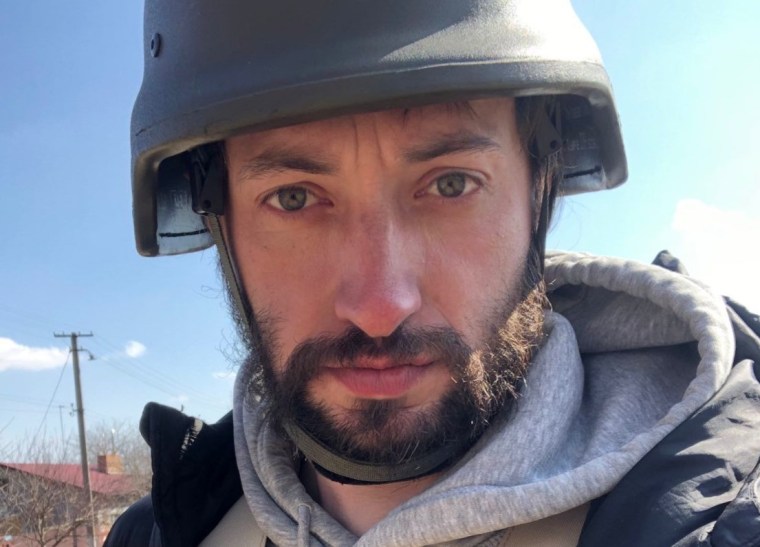Paris, March 29, 2022 – Russian authorities should stop detaining Ukrainian journalists covering the war and ensure that they can report safely and without fear of reprisal, the Committee to Protect Journalists said Tuesday.
On March 25, Russian forces shelled a civilian convoy in the northern region of Chernihiv, injuring Andriy Tsaplienko, a reporter with the Ukrainian TV broadcaster 1+1, according to media reports and a statement by his outlet.
The following day, Oleksandr Navrotskyi, a camera operator for the Ukrainian broadcaster Channel 24, was injured in a Russian shelling attack on the village of Lukyanovka, in the Kyiv region, according to media reports and the journalists’ colleagues, who spoke with CPJ.
Also on March 26, Russian forces detained journalist Iryna Dubchenko in the southeast city of Rozivka, and took her to the Russia-backed separatist-controlled city of Donetsk, according to media reports and posts on social media shared by the journalist’s friends.
“Russia-backed forces must release journalist Iryna Dubchenko immediately, and Russia must ensure that members of the Ukrainian press are not targeted in the war,” said Gulnoza Said, CPJ’s Europe and Central Asia program coordinator, in New York. “Journalists are civilians under international humanitarian law, and Russian and Ukrainian authorities should ensure their protection in conflict areas.”
Andriy Tsaplienko injured in shelling
On March 25, Russian forces in Chernihiv shelled a convoy of evacuating civilians and injured Tsaplienko, who was filming the evacuation, according to news reports, an Instagram post by Tsaplienko’s colleague Dmitry Komarov, and a statement by his outlet.
Tsaplienko sustained a minor injury to his thigh and was treated at a local hospital, according to those sources.
Komarov wrote in his post that, because of the humanitarian nature of the evacuation, the convoy was “a place where shelling is not allowed by all the written and unwritten rules.”
Journalists with the Turkish broadcaster TRT World were also present during the shelling and were not injured, according to those reports. Tsaplienko has covered the war in Ukraine and has extensively covered wars throughout the world, according to reports.
Oleksandr Navrotskyi injured in shelling
On March 26, Russian forces shelled the village of Lukyanovka, injuring Navrotskyi, according to media reports, a statement by his employer, and Channel 24 executive producer Bohdan Tugushi, who spoke to CPJ in a phone interview.
Navrotskyi was filming while being escorted by Ukrainian military when he was struck in the knee by shrapnel produced by a Russian rocket strike, according to those sources.
Tugushi told CPJ that, as of Tuesday, Navrotskyi had undergone three operations.
“Doctors say they cannot affirm whether he will be able to walk again, because the knee injury is very serious,” Tugushi told CPJ, adding that the doctors said he needed to undergo at least two more operations.
Tugushi told CPJ that Navrotskyi had worked for Channel 24 for seven years, and had experience covering war. Volodymyr Sydko, a reporter for the Ukrainian TV broadcaster NTN, told CPJ via messaging app that he had been working with Navrotskyi on documentary film projects covering Russia’s invasion since 2014.
Iryna Dubchenko detained by Russian forces
On March 26, Russian forces detained Dubchenko and took her to Donetsk, according to media reports, a report by the Ukrainian National Union of Journalists, and social media posts by the journalist’s sister Oleksandra Dubchenko and 1+1 correspondent Yakiv Noskov, who first reported her detention.
On March 28, the Russian military commandant’s office in Rozivka told Dubchenko’s family that the journalist had disappeared two days before and was taken to Donetsk, according to those sources.
When Russian soldiers searched her home on March 26, they said they “knew everything about [Dubchenko’s] journalistic activities,” her sister told the journalists’ union. Dubchenko has worked for Ukrainian outlets including the news website Depo.Zaporizhzhia, newspaper Subota, and the UNIAN news agency, according to those media reports. Her sister said she had worked throughout the Russian invasion of Ukraine.
Oleksandra Dubchenko told CPJ via messaging app that her sister called her on March 26, saying that Russian forces tried to search her house and told here to stay home.
During the search, Russian forces accused Dubchenko of hiding a wounded Ukrainian soldier at her home and took her to Donetsk for an “investigative action,” according to her sister’s video and Noskov’s post.
CPJ was not able to independently verify the reason Dubchenko was detained.
Prior to her detention, Dubchenko told her sister on March 26 that Russian forces had occupied Rozivka and that a local resident had told those forces that Dubchenko had been involved in volunteer work and journalism, Oleksandra Dubchenko said in that video. Oleksandra said she then lost contact with her sister.
On March 29, the Ukrainian military administration of the Zaporizhzhia region, which includes Rozivka, confirmed the journalist’s abduction and said that “response measures are being taken.” CPJ emailed the Zaporizhzhia military administration for comment but did not receive any response.
CPJ is also investigating Russian forces’ alleged abduction of journalist Konstantin Ovsyannikov in the southeast city of Prymorsk on March 26. Multiple civil society groups in the area posted on social media that Ovsyannikov had been detained; those groups and unidentified people posted later that day saying he had been released.
Ovsyannikov recently covered Ukrainians’ protests against the Russian occupation in Prymorsk, according to reports.
CPJ emailed Russian and Ukrainian Ministries of Defense, as well as the self-proclaimed Donetsk People’s Republic for comment but did not receive any replies.
[Editors’ note: This article has been changed in its 16th paragraph to correct the name of the office that spoke to Dubchenko’s family.]
